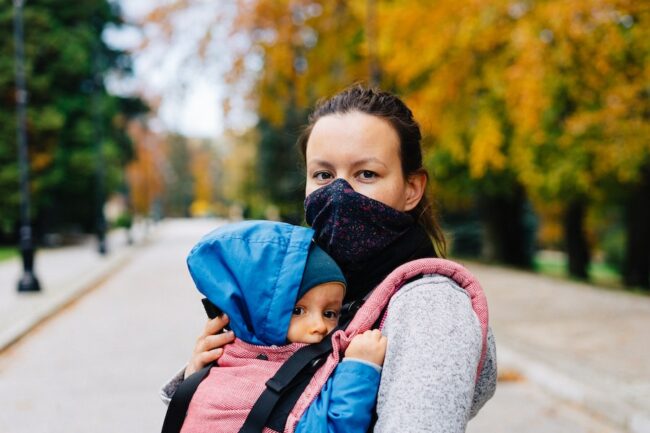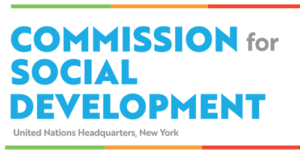Care and Education at the heart of a transformative recovery
07.01.22
UN New York, Commission on Social Development - MMM written statement to the 60th session focuses on its main priority theme: 'Inclusive and resilient recovery from COVID-19 for sustainable livelihoods, well-being and dignity for all: eradicating poverty and hunger in all its forms and dimensions to achieve the 2030 Agenda'.

The Covid-19 pandemic has led to dramatic losses in human life and devastating economic and social disruption worldwide, exposing and exacerbating pre-existing vulnerabilities and inequalities.
Before the pandemic, women – mothers in particular – were already more represented in informal economies, less likely to have access to social protection, less paid than men, over-represented in poverty statistics, and economically penalized by their disproportionate share of unpaid care work. The pandemic only worsened their situation.
Mothers were hit particularly hard
Increase in unpaid family care work, especially childcare:
With the closure of schools and childcare services, home schooling and family members tele-working, as well as the reduction in care support provided by the extended family members, notably grandmothers, mothers absorbed a large part of the lockdown shock with unpaid care work.
Loss of job or livelihoods:
A number of economic sectors with a large proportion of female employees (e.g. tourism, non-food retail…) were particularly hit by the economic crisis that followed lockdowns, forcing lay-offs. Many mothers who were in part time or precarious employment in order to remain available to their families also lost their jobs. Or they had to quit because of the increase in unpaid care work and the resulting lack of time for paid work. Others simply lost their livelihoods as informal workers due to lockdowns.
The direct consequence is poverty increase, with approximately 96 million people pushed into poverty as a result of covid-19, of whom 47 million are women and girls; pulling up to 435 million the number of women and girls living on less than $1.90 a day globally.
Deterioration in mental health:
In addition to anxieties about new contaminations and economic uncertainties, ongoing lockdowns, increased care responsibilities, the challenges of work life balance, isolation and disconnection from usual support networks, all contributed to exhaustion and mental health deterioration in mothers – especially single mothers.
Challenges to accessing quality, essential maternal and newborn maternal health services:
Resources and health workers, including midwives, had to be diverted to Covid-19 response efforts, disrupting maternal and child health services. In addition, pregnant women and mothers with newborns experienced difficulties accessing services due to lockdown measures and restricted access to health facilities. They were also reluctant to go to health facilities for fear of infection.
This situation could be life threatening in the event of complications during pregnancy or around childbirth, and maternal mortality and morbidity is expected to increase, especially in low-income countries.
Spotlight on key failures of our social and economic systems
As we continue to confront this crisis and its impacts, with the inevitable disruption to our society and economy, we are reminded that there are lessons also to be learned as it has put a spotlight on key failures of our social and economic systems.
In particular:
- The crisis has shown how Care is central to our lives. It has shown that whether paid or unpaid, this essential work is not properly recognized and valued neither in our society nor in our economy. It has exposed the fact that most of the unpaid family care work falls on the shoulders of women, and how this inequitable distribution of unpaid care work and responsibilities is a challenge, notably for mothers who have to juggle care responsibilities and paid work. It has made clear that unpaid care work is a cause of economic hardship and injustice for women.
- The crisis has exposed gaps in social protection and the inadequacy of current systems, in particular in developing countries. It has also shown the critical role of grassroots NGOs and solidarity among people within families and communities – in filling those gaps.
The way forward: transitioning to a wellbeing economy
The covid-19 crisis provides a unique opportunity for transformative change to address these systemic failures, which impact mothers in particular. It is about changing narratives and taking action.
Recognition and support of unpaid care work as essential work – and a collective responsibility
It is high time that governments
- recognize that unpaid care work IS work, essential work
- recognize that it benefits the whole society across generations and sustains the economy – and therefore that it is public good and a collective responsibility
- address the issue of its inequitable distribution through redistributive policies and adequate public infrastructure and services
- seriously invest in supporting women, parents and other caregivers doing this valuable yet unpaid and mostly invisible work of caring and raising the next generation
Concretely, implementing the ICLS 2013 resolution on the statistics of work – which in fact recognizes unpaid care work as work – would also make it visible, on a par with Labour Statistics. Mobilising the whole government to develop a national care policy – like Uruguay did – is also one way to move forward.
Universal social protection
Social protection is key for unpaid caregivers whose time poverty often translates into poverty or lack of economic independence, especially for mothers.
Recognizing unpaid care work as work, every unpaid caregiver should have access to social protection – just like any other worker. In particular, every mother should be supported through access to social security, healthcare, pension rights and full maternity protection – whether she is engaged in paid work or not. Universal social protection is one way to answer this imperative.
Furthermore, social protection must be considered as an investment, not as an expense that should be minimized. Supporting caregivers, parents especially, through adequate public services and social protection is investing in people and families.
Ultimately it is also about investing in children – and we know how critical nurturing care is during the early years of a child, and the high returns it can bring, mainly for vulnerable families. Similarly, investing in maternal mental health is cost effective. And prioritizing the Covid-19 vaccine for mothers is essential for the current and future wellbeing of their children: they cannot afford to be sick – especially single mothers.
Systemic transformation of our economy
Taking a broader view, the many crises we face today (i.e. Covid-19, environmental degradation and climate change, increased inequalities, care crisis…) are deeply rooted in an economic system that fails to recognize, value, protect, and invest in what’s essential to our wellbeing – it begins with Care.
As noted by UN Women’s Silke Staab, “Care for people and for the natural environment, although distinct, have much in common: they largely take place outside of markets, they produce public goods whose benefits extend beyond individuals and across generations, and they are essential for the functioning, sustainability and survival of economies and humanity at large.”
We have every reason to transform our economic system and drop the ‘GDP growth’ narrative: Gross Domestic Product only measures the monetised economy, and notably fails to account for unpaid care work and the work of nature. It also says nothing about the social or ecological relevance of this economic activity, and nothing about its ‘collateral damage’ (e.g women’s poverty, environmental degradation…). And indeed endless ‘growth’ must be questioned given the physical boundaries of our planet.
It is time for a paradigm shift and for governments to build a new economic system where the long-term wellbeing of people and the planet are prioritised; it is time that they transition towards a wellbeing economy – with care and education at the centre.
 It is a political decision that can and must be made. It is about the objectives of our economic system, what it values, and the indicators that it uses to drive it.
It is a political decision that can and must be made. It is about the objectives of our economic system, what it values, and the indicators that it uses to drive it.
The five governments who are part of the Wellbeing Economy Partnership (WEGo), i.e. Finland, Iceland, New Zealand, Scotland and Wales, are showing us the way. Using a participatory approach, they have defined new sets of wellbeing indicators and re-oriented policymaking and budgets to improve these indicators.
We at MMM are calling on all governments at every level to follow their lead.
MMM Statement for download – with references and list of co-signatories
![]() MMM Statement as UN Document (ref. E/CN.5/2022/NGO/38)
MMM Statement as UN Document (ref. E/CN.5/2022/NGO/38)
 The 60th session of the UN Commission on Social Development (CSocD60) will take place virtually from 7 to 16 February 2022.
The 60th session of the UN Commission on Social Development (CSocD60) will take place virtually from 7 to 16 February 2022.
The New EU Gender Equality Roadmap : A Call for Inclusion of Mothers
04.03.25
The European Commission’s initiative on a new Gender Equality Roadmap post-2025, marks a significant step forward in addressing gender disparities across the European Union. Make Mothers Matter (MMM
Breaking the Cycle: Gender Equality as a Path to Better Mental Health
18.03.25
The Council of the European Union has taken a decisive step in recognising the vital connection between gender equality and mental health.
Europe Must Listen to Mothers: Our landmark report heads to the European Parliament
28.08.25
On 22 September 2025, the voices of mothers will take centre stage in Brussels. For the first time, Make Mothers Matter (MMM) will present its State of Motherhood in Europe








